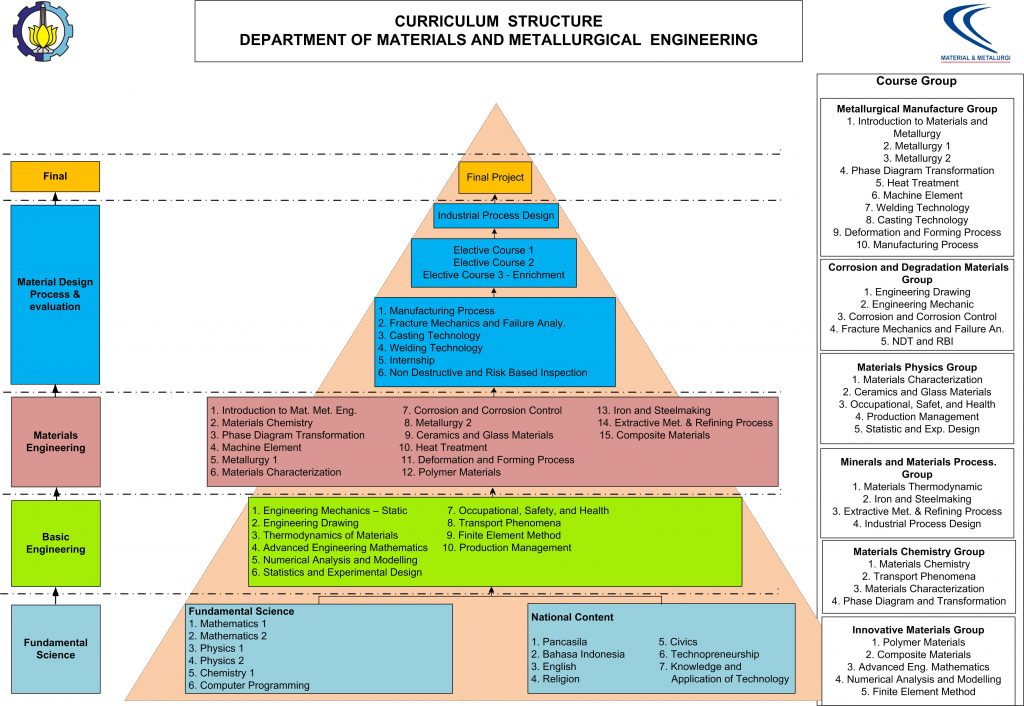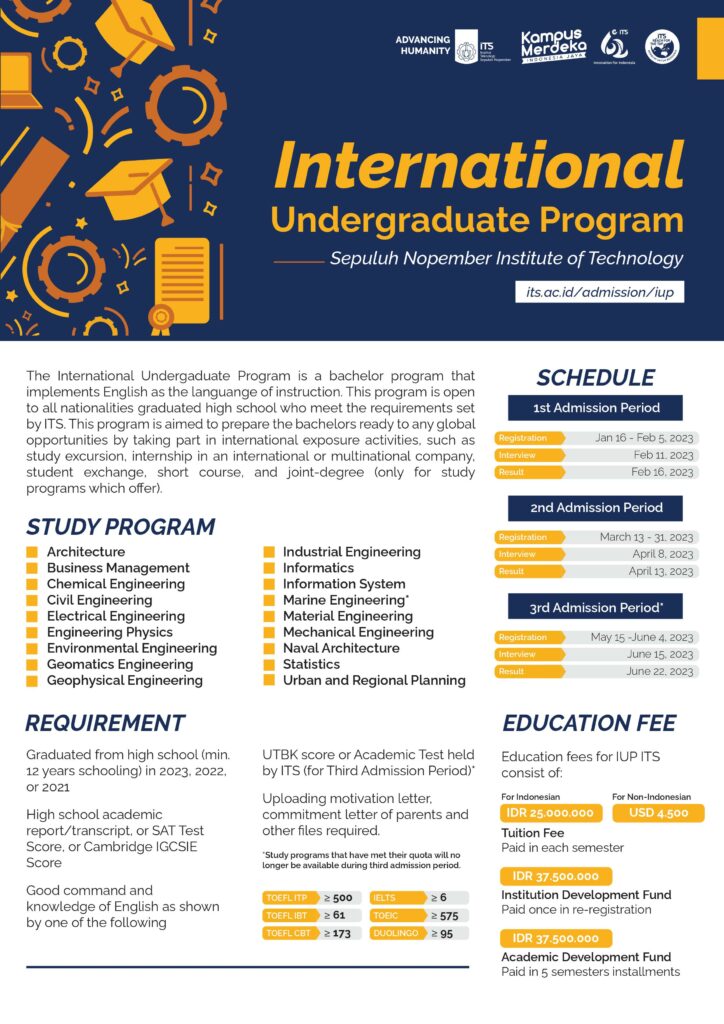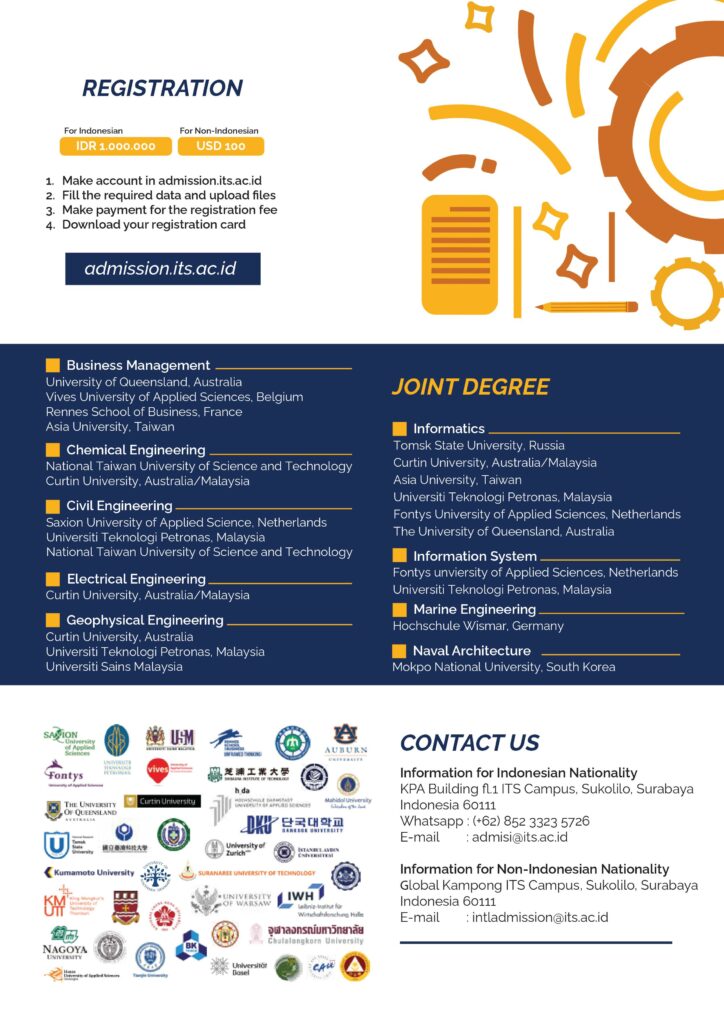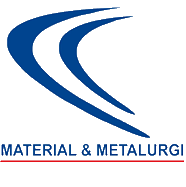International Undergraduate Program (IUP)
Institut Teknologi Sepuluh Nopember (ITS) is one of the best universities in Indonesia, as according to the assessment by Indonesia’s Ministry of Research, Technology, and Higher Education (Kemristekdikti), as well as included in the Top 10 Universities in Indonesia on both the QS World University Ranking and the Times Higher Education (THE) World University Ranking.Complemented with a conducive green environment, over a thousand highly-qualified academic staffs, and 180 hectares of total area, ITS prioritizes excellent and first-rate education, research, and innovation. Facts have shown that ITS’ many achievements are recognized both nationally and internationally.In 2019, ITS proudly launched the establishment of 20 International Undergraduate Programs for Indonesian students alongside foreign students. The following list consist of the 20 International Undergraduate Programs being offered at Institut Teknologi Sepuluh Nopember. Department of Materials and Metallurgical Engineering is one of department in ITS that has an International Undergraduate Program (IUP)
Department of Material and Metallurgical Engineering is under the Faculty of Information Technology, Sepuluh Nopember Institute of Technology (ITS) Surabaya. The Material and Metallurgical Engineering Department has a vision to be a department that has advantages, global competence in the field of materials engineering and technology to support the development of science and technology and industry. Students in the Department of Material and Metallurgical Engineering are prepared to be human beings who are skilled in designing and analyzing material and metallurgical engineering requirements for organizations, designing project development in material and metallurgical contexts by comprehensively combining into finished materials in the form of hardware, software, networks, data, processes and procedures , which mainly produces strong and skilled human resources. Students are also provided with basic skills and advances in the application of material processing and development, network infrastructure, maintenance of metal materials to become finished products that can be used by the community.
International Program and International Cooperation With Japan, South Korea, Thailand more information Clik here
LEARNING OUTCOME
- CPL – 1 Able to demonstrate attitudes and characters that reflect: piety to God Almighty, ethics and integrity, virtuous character, sensitive and concerned about social and environmental issues, respecting cultural differences and pluralism, upholding high law enforcement, prioritizing the interests of the nation and the wider community , through creativity and innovation, excellence, strong leadership, synergy, and other potentials to achieve maximum results
- CPL – 2 Able to carry out a study that utilizes science and technology to the field of industrial systems engineering and able to make appropriate decisions from the results of their own work or group work in the form of final project reports or other forms of learning activities whose output is equivalent to the final project through logical thinking, critical thinking, systematic, and innovative
- CPL – 3 Able to manage self-learning and develop oneself as a personal lifelong learner to compete at national and international levels, in order to make a real contribution to solve problems by implementing information and communication technology based on the principles of sustainability and technology-based entrepreneurship
- CPL – 4 Able to solve materials engineering and metallurgical problems using science, technology, and mathematics
- CPL – 5 Able to design components, systems, and processes for materials and metallurgical engineering based on engineering, economy, energy, environment, and sustainability
- CPL – 6 Able to formulate decisions based on data analysis, information, experiments, and or practical experience
- CPL – 7 Able to identify, analyze and formulate alternative solutions for materials engineering and metallurgy
- CPL – 8 Able to apply modern tools for engineering design and analysis
- CPL – 9 Able to communicate effectively, both orally and writing
- CPL – 10 Able to plan, complete and evaluate tasks within existing constraints as needed
AUTONOMOUS PROFILE OF MATERIALS AND METALLURGICAL ENGINEERING DEPARTMENT
- Individual who are able to solve problems in managing and utilizing local, national and global resources based on the principles of basic science and materials-metallurgical engineering
- Individual who has good moral personality and leadership, able to communicate and solving in task in organization considering profession ethics and other ethic
- Individual who is able to do continuous self improvement
- Education Implementation Survey click here
- Document of Survey Results for Alumni and Graduate Users, click here
- Tracer Study Data: Click Tracer Study Document here
FIELD OF GRADUATES
In the Undergraduate Program in the department of material engineering and metallurgy, there are 4 areas of expertise, namely:
- Extractive Metallurgy
- Manufacturing Metallurgy
- Corrosion and Failure
- Innovative Materials
CURRICULUM STRUCTURE

Curriculum 2018-2023
| Semester 1 Subject |
credit | Semester 2 Subject |
credit | |
| Indonesian | 2 | English | 2 | |
| Civics | 2 | Mathematics 2 | 3 | |
| Chemistry 1 | 2 | Pancasila | 2 | |
| Physics 1 + p | 2 | Physics 2 | 3 | |
| Mathematics 1 | 2 | Engineering Mechanics-Static | 2 | |
| Religion | 2 | Engineering Drawings + A | 3 | |
| Introduction to Materials and Metallurgical Engineering | 2 | Materials Chemistry + P | 3 | |
| Number of credit | 18 | Number of credit | 18 |
| Semester 3 Subject |
credit | Semester 4 Subject |
credit | |
| Materials Thermodynamics | 3 | Materials Characterization | 3 | |
| Computer Programming | 3 | Corrosion and Corrosion Control + P | 3 | |
| Phase Diagram and Transformation | 3 | Manufacturing Process + P | 3 | |
| Machine Design | 3 | Metallurgy 2 + P | 3 | |
| Metallurgy 1 + P | 3 | Numerical Analysis and Modeling | 3 | |
| Advanced Engineering Mathematics | 3 | Statistics and Experimental Design | 3 | |
| Number of credit | 18 | Number of credit | 18 |
| Semester 5 Subject |
credit | Semester 6 Subject |
credit | |
| Ceramics and Glass Materials | 3 | Technopreneurship | 2 | |
| Fracture Mechanics and Failure Analysis | 3 | Polymer Materials* | 3 | |
| Occupational Safety and Health | 3 | Iron and Steel Making | 3 | |
| Heat Treatment + P | 3 | Welding Technology + TB | 3 | |
| Casting Technology + TB | 3 | Finite Element Method | 3 | |
| Deformation and Formation Processes | 3 | Transport Phenomena | 4 | |
| Number of credit | 18 | Number of credit | 18 |
| Semester 7 Subject |
credit | Semester 8 Subject |
credit | |
| Concept of Technology | 3 | Industrial Process Design + TB | 3 | |
| Extractive Metallurgy and Refining Process + P | 3 | Final Project | 6 | |
| Production Management | 4 | Elective 3 * Enrichment | 3 | |
| Composite Material* | 3 | Elective 11 | 3 | |
| Internship | 2 | Elective 2 | 3 | |
| Non Destructive and Risk Based Inspection | 3 | Number of credit | 18 | |
| Number of credit | 18 |
FLYER IUP


LIST DOCUMENT OF CURRICULUM
For course schedule, click here
Download Flyer IUP 2023 here
Download Curriculum Book 2014-2019 clik here
Download Assessment Method Plan 2018 clik here
Download Curriculum Book 2018-2023 clik here
Download Semester Learning Plan Book 2018-2023 clik here
Download Curriculum Development book 2018-2023 click here
Download Syllabus Curriculum Development 2018-2023 clik here
Download RPS Curriclum 2018-2023 clik here
Download Quality Assurance Guide clik here
Download Transfer Credit for International Exchange Program click here
Download the Lesson of Even Semester 2019/2020 here
Download Procedure for Assessment, Evaluation and Follow Up of Learning Outcomes here
Download letter of additional learning outcomes in the judicial process here
Download Syllabus Curriculum 2018-2023 (SN DIKTI Version ) here
